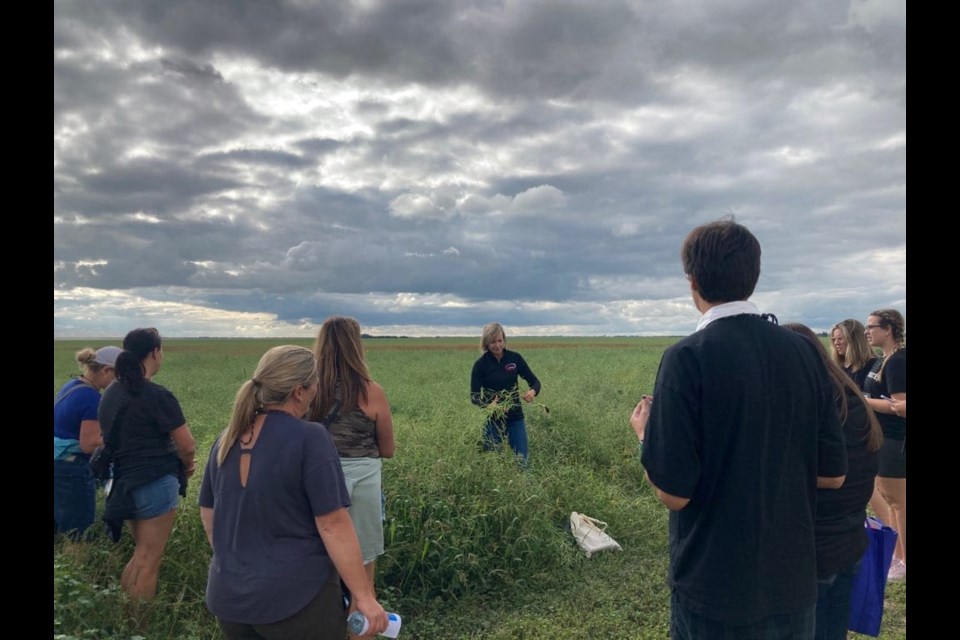After the death of local farmer J.C. Tremblay, his family wanted to do something noteworthy in his honour. His vision was to see farmers empowered in their hard work of providing food for the community, and he saw value in the next generation understanding the importance of agriculture.
“J.C. was a farmer in the Moose Jaw and Coderre area,” said Sara Shymko, the executive director of Agriculture in the Classroom Saskatchewan (AITC-SK).
“He really believed in the importance of young people learning where their food comes from, and the agricultural practices and the technologies (behind it). He was a big supporter of Agriculture in the Classroom,” she said.
His family chose Agriculture in the Classroom as the recipient charity to support.
“When they talked about what would have value and meaning to honour J.C., they chose Agriculture in the Classroom as a recipient. We were surprised, and really honoured by that choice,” Shymko said.
“He understood the value of agricultural education… (so) as farmers, they could continue to make good choices on their farm and have a society that supports them, (while) building a future workforce for agriculture. He had a strong personal belief in the work that we did,” Shymko explained.
Agriculture in the Classroom is a registered charity helping connect today’s youth with the practice of agriculture and its mission is to inspire more careers in the field.
“(We) provide programs and educational resources to schools and students across the province to help them learn about agriculture, connect with the farmers who are growing the food, and inspire them to hopefully choose a career in agriculture,” said Shymko.
Agriculture in the Classroom has established several food farms across the province to teach students on a practical level.
“The food farm program takes place in a number of areas across the province. In spring, students come and plant different things,” Shymko explained. “The same students come back to harvest the vegetables that they planted and also learn about the harvest of the grain crops that are grown.”
“To keep it interactive and exciting for the students, we set up stations and they spend 12-15 minutes at the station doing hands-on activities,” Shymko said. This can vary from harvesting potatoes to pulsing chickpeas to make hummus, and live animals are frequently brought out for a firsthand experience.
Shymko said the goal is to provide an immersive experience, and students get their hands dirty while learning rather than attending a lecture.
The important role of agriculture cannot be underestimated.
“Every day, people eat. Food and the availability of food impacts everybody,” Shymko said.
Shymko pointed out that we’re given abundant choices when it comes to our food, and these choices involve what to eat, how to prepare it, the nutritional value, and even to decide on a purchase based on how it was grown. With so much variety of choice, it’s important to make informed decisions.
“Empowering young people to be able to think critically and make good decisions for themselves, their family, and the environment is really important to us,” she said.
As the agriculture industry continues to advance, it can get harder to understand. Farmers seek to make the best decisions in the field, but more frequently these choices are misunderstood by society in general.
This causes a ripple effect where policies may be put in place contrary to best practices, and public sentiment might run contrary to the truth.
“Farmers are making decisions with sustainability in mind because they want to be there next year, and they want their children to take over the farm. They really care whether it’s the land or the animals…,” Shymko stated.
“We help to bridge that knowledge gap and increase the understanding and support for modern agriculture practices.”
Agriculture in the Classroom will use the recent donation to prepare and distribute educational resources for teachers, in addition to maintaining the educational food farms. These resources include seed kits featuring local crops, story books, lesson plans, and more.
“We’re very appreciative and thankful to the family for choosing us, and for all of the other partners within the Moose Jaw area who support the food farms and our other initiatives,” Shymko said.
Agriculture in the Classroom Saskatchewan seeks to inspire future generations to pursue a meaningful career in agriculture and keep Saskatchewan a world leader in agriculture. Last year alone, it provided 259,460 student experiences to over 72,000 students from 618 schools in 247 communities across the province.
For more information, visit the organization’s website at www.aitc.sk.ca.
In response to some providers blocking access to Canadian news on their platforms, our website, MooseJawToday.com will continue to be your source for hyper-local Moose Jaw news. Bookmark MooseJawToday.com and sign up for our free online newsletter to read the latest local developments.




